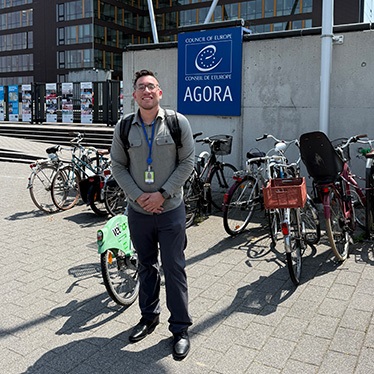Ajello Fellows create open data repository of electric grid in Vietnam
November 13, 2020
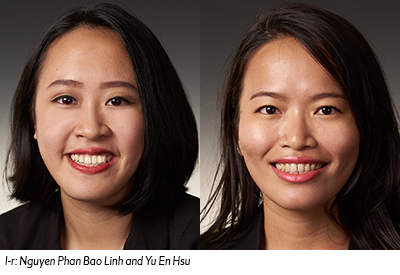 In many ways, Nguyen Phan Bao Linh and Yu En Hsu seem like opposite sides of the same coin: both are international students enrolled in Maxwell’s #1 ranked M.P.A. program, both are among the first to pursue the program’s new certificate
in Data
Analytics for Public Policy, and—when the pandemic hit the U.S. last spring—both reached out to their favorite professor for help navigating the uncertainties of finishing the program.
In many ways, Nguyen Phan Bao Linh and Yu En Hsu seem like opposite sides of the same coin: both are international students enrolled in Maxwell’s #1 ranked M.P.A. program, both are among the first to pursue the program’s new certificate
in Data
Analytics for Public Policy, and—when the pandemic hit the U.S. last spring—both reached out to their favorite professor for help navigating the uncertainties of finishing the program.
"There were so many uncertainties…financial stress, everything,” Hsu recalls. In addition, to their program, Nguyen and Hsu both planned to complete a summer internship at the same time in-person opportunities were being shuttered in order to slow the spread of COVID-19.
Their professor, economist Peter Wilcoxen who directs the Center for Environmental Policy and Administration, is the Ajello Professor of Energy and Environmental Policy at the Maxwell School. The generous donationfrom James Ajello M.P.A. ’76 that created the professorship also provides funding for graduate fellowships. “When the pandemic hit, Linh and Yu En were worried that they wouldn’t be able to find internships and would have to leave the program. They’re both excellent students and that would have been a real loss. I was so grateful that Jim had given us funding for fellowships,” says Professor Wilcoxen. “That gave us the flexibility to quickly put together a project that let them use their unique skills and abilities to create a valuable resource for sustainability researchers worldwide.”
While their current interests and aspirations are similar, Nguyen and Hsu come from very different backgrounds. Hsu, a talented coder and data analyst from Taiwan, earned her undergraduate degree in business administration before working on non-profit social projects around the world. Until finding the M.P.A. program at Maxwell, she thought she’d pursue an MBA. “I really liked numbers and analytics.”
Nguyen, a seasoned government communications and public affairs manager, came to Maxwell specifically to improve her quantitative skills. A second-generation immigrant to Ukraine, Nguyen is ethnically Vietnamese and fluent in the language—a skill that would prove fundamental to their project.
"Yu En and I are two people who are completely different with skillsets,” she says. “She taught me how to work with numbers, and I helped her with context and policy. We were a natural fit.”
It turned out to be a serendipitous match that resulted in the creation of Vietnam Power Plants database, a new open source data repository focused on the sustainability of the electric grid in Vietnam.
Creating a durable resource for a more sustainable future for all
"Understanding the evolution of the grid in developing countries is important and much harder than in developed countries,” Wilcoxen explains. “In the U.S., demand has leveled off, so we can shift our focus on how to create our energy more sustainably. But, in developing countries, concerns over sustainability compete with the more urgent need for power to keep the lights on.”
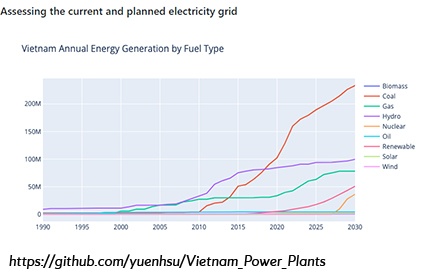 The pair’s proposal, Vietnam’s Electricity Grid: Pathway to Sustainability, aimed to accomplish two goals: “We wanted first, to assess the existing grid and second, to evaluate Vietnam’s plans for future sustainability,” says Nguyen.
“During the process, we realized there’s no way for us to assess the grid if we cannot create a master list of operating plants.”
The pair’s proposal, Vietnam’s Electricity Grid: Pathway to Sustainability, aimed to accomplish two goals: “We wanted first, to assess the existing grid and second, to evaluate Vietnam’s plans for future sustainability,” says Nguyen.
“During the process, we realized there’s no way for us to assess the grid if we cannot create a master list of operating plants.”
Together, Hsu and Nguyen set out to acquire, translate, verify and consolidate all existing power plant data into a master list. They browsed through countless official Vietnamese government documents, Google and the World Resource Institute (WRI) to verify currently operational power plants. “Yu En and I spent at least three weeks acquiring government documentation, and parsing and cleaning the data. Then we spent a few weeks translating it from Vietnamese to English, English to Vietnamese. To make sure the data was accurate, we updated capacity for each plant, verified its coordinates, location and type of fuel. We encountered various challenges related to mixed fuel plants and bundled energy projects that have conflicting documentation,” says Nguyen.
When Hsu and Nguyen finished the master list of operational power plants, they analyzed the data in two parts. “In the first part, we mapped out different line charts and bar charts to see the trends in energy generation by fuel type. I think you can really see how fast the electricity from coal is climbing, and how overall electricity use has just skyrocketed in the past two decades,” Hsu says.
“In the second part, we had to use GIS software to pinpoint each of the plants. After we filtered out all the hydro or nuclear, wind and solar plants, we had gas, oil and coal left,” she explains. “We decided to use a buffer to model the range of pollution. We overlapped [the buffers] with the population distribution,” Hsu said.
After running a buffer analysis, Nguyen and Hsu were able to make policy recommendations for power plants to be either updated or closed, based on their fuel type, air pollution emissions and proximity to dense population centers. In the future, Hsu and Nguyen hope others will be able to utilize their master list for different further analysis of Vietnam’s electricity grid.
The pair have recently published their data on GitHub’s open-access forum at (https://github.com/yuenhsu/Vietnam_Power_Plants) making it available to anyone interested in analyzing it. “I think that was our initial thought,” Hsu recalls. “It would be a public good and everyone can take advantage and benefit from it…GitHub makes it easier because people can spot problems, and they can fork the data. They don’t have to email me and go back and forth,” she says.
Supporting unforeseen challenges – and unforeseen opportunities
Nguyen and Hsu are thankful for Jim Ajello’s generosity. Without his sponsorship, they might have been significantly set back in progressing through the M.P.A. and Data Analytics program. But more importantly, his gift allowed them to explore an area they may not have pursued on their own, and to create an enduring public resource that would not have existed otherwise.
"A very important part of donor sponsored programs is to take away the burden of thinking about money when you are working on a wicked problem that requires you to invest a lot of time,” Nguyen says. “That allowed us to pour ourselves into this project.”
“It also allows us to explore projects that we would otherwise not go into. For example, sustainability is new for me. I think that if I wouldn’t have had this pillow, I would be very scared to try something like this.”
11/16/20
Published in the Summer 2021 issue of the Maxwell Perspective
Related News
School News

Dec 4, 2025
Commentary
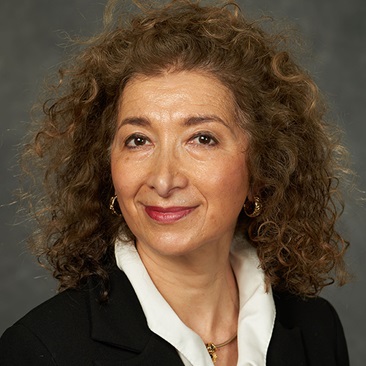
Nov 26, 2025
School News
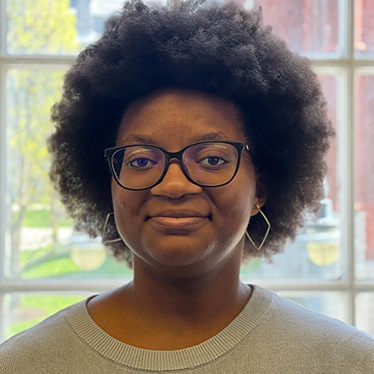
Nov 25, 2025
